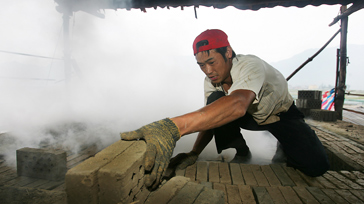News on forced labour
April 2015
-
Training on Labour Dimensions of Trafficking in Persons in Malaysia
Labour inspectors of the MOHR and other stakeholders participated in the training course on the labour dimensions of trafficking in persons in Malaysia with an aim to better understand and identify indicators of forced labour in labour exploitation situations.
March 2015
-
Consultation Meeting on Qualitative Assessment of Returnees Migrant Domestic Workers in Indonesia
The Global Action Programme on Migrant Domestic Workers and Their Families (GAP-MDW) organized a consultation meeting to provide a space for national constituents to share inputs and perspectives on proposal research on returned migrant domestic workers in Indonesia. The study aims to document through a qualitative survey the working conditions and forced labour risks faced by Indonesian domestic workers in Malaysia and their reintegration challenges.
-
Training for TIP National Focal Points
-
Labour Migration Academy (trilingual course)
This global training activity on international labour migration reviews and analyses key issues, strategies, policies and tools for better governance of international labour migration, linking migration and development, and promoting the protection of rights of migrant workers and their families.. In addition to plenary sessions the academy offers the possibility to participants through elective courses to analyze as well in-depth key topics related to labour migration. The academy will therefore give a broad overview of the different challenges and opportunities related to international labour migration, but it will also give the opportunity to participants to tailor-made the reinforcement of their capacities according to their specific needs.
-
Regulating recruitment: labour and criminal justice responses in preventing trafficking in persons and migrant exploitation
In today’s globalized economy workers are increasingly looking for job opportunities beyond their home country and the recruitment and employment of workers across global supply chains is a pressing concern. While some of the cross-border recruitment process is facilitated by social and informal networks, private employment agencies play an increasing role in matching labour demand and supply across borders. Globally, the Middle East remains one of the most competitive labour markets with around 70 per cent of migrant workers coming from Asia.
-
Workshop on the Fair Recruitment Initiative
On the 23rd and 24th of April 2014, the ILO Special Action Programme to combat Forced Labour (SAPFL), in collaboration with the ILO’s Labour Migration Branch (MIGRANT) and the International Training Centre in Turin, hosted a first consultative workshop on the ILO Fair Recruitment Initiative (FRI) under the auspices of the Global Migration Group (GMG), which is currently chaired by ILO.
-
Why framing the discourse on human trafficking is important - some thoughts
05 March 2015
February 2015
-
Course "Identifying and investigating cases of forced labour and trafficking"
The main objective of the course is to train participants to better identify and investigate cases of forced labour, including trafficking for labour exploitation. The course addresses the different stages of the process (inspecting workplaces, interviewing victims, gathering evidence), with a focus on the private sector (textile, agriculture, domestic work, etc.).
-

© Bu ensa / AFP 2024
“There is no inevitability, no excuse: Forced labour can be stopped”
20 February 2015
ILO Director-General Guy Ryder vows ILO leadership in fight against forced labour on World Day of Social Justice.
-
Panel on Labor Rights and Human Trafficking